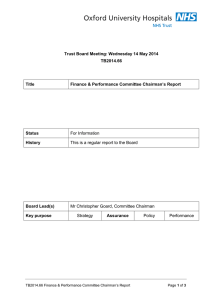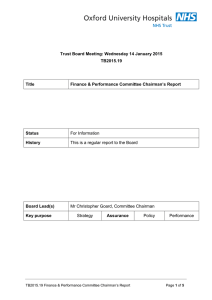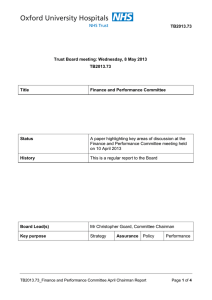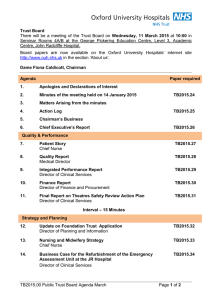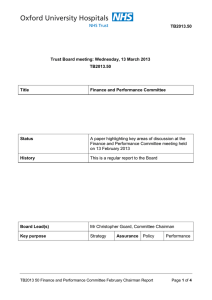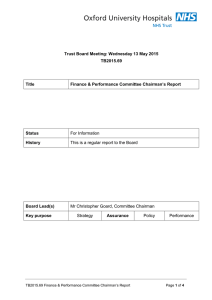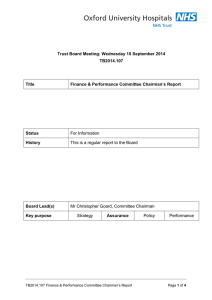Trust Board Meeting: Wednesday 11 March 2015 TB2015.40 Title
advertisement
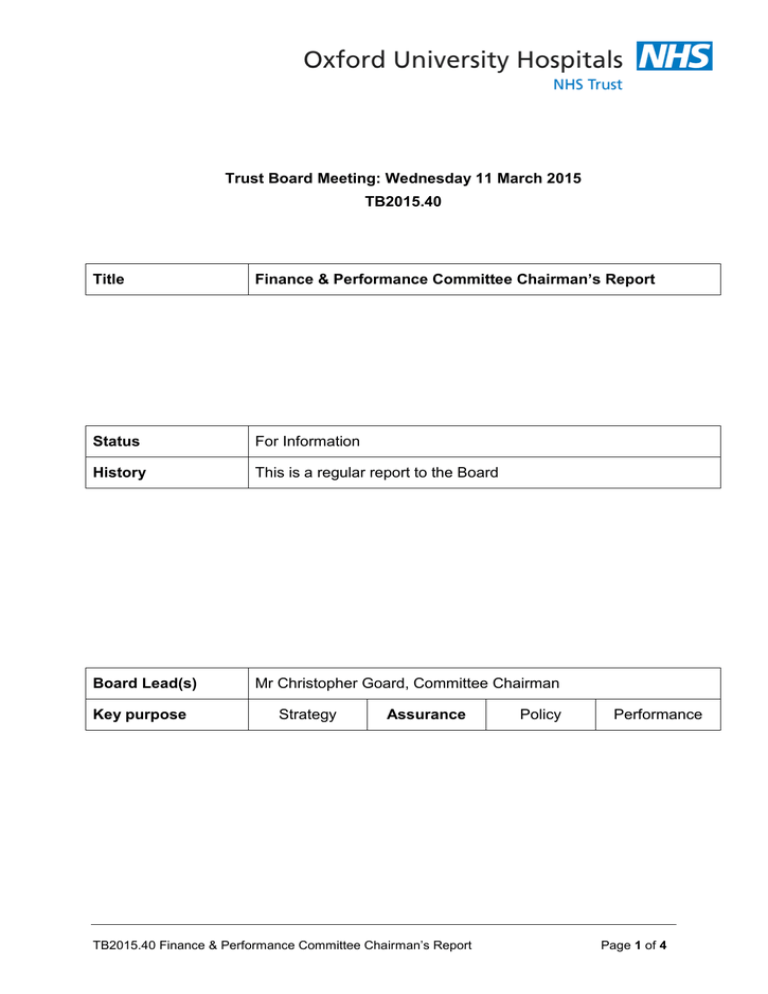
Trust Board Meeting: Wednesday 11 March 2015 TB2015.40 Title Finance & Performance Committee Chairman’s Report Status For Information History This is a regular report to the Board Board Lead(s) Mr Christopher Goard, Committee Chairman Key purpose Strategy Assurance TB2015.40 Finance & Performance Committee Chairman’s Report Policy Performance Page 1 of 4 Oxford University Hospitals TB2015.40 1. Introduction The Finance and Performance Committee met on 11 February 2015. The main issues raised and discussed at the meeting are set out below. 2. Significant issues of interest to the Board The following issues of interest have been highlighted for the Trust Board: a) The Committee considered the forecast of the Trust’s year-end financial position for 2014/15 as at Month 9, reporting a year-to-date position on plan. It was however noted that, underlying this reported position, there was an over-spend on Divisional expenditure, and activity under-performance against commissioner contracts. This was offset by a corporate underspend that was largely nonrecurrent. The underlying financial pressure will need to be tackled in 2015/16. An additional cost pressure of approximately £10m is expected, in relation to the increased contribution assessed as payable to the NHS Litigation Authority [NHSLA]. The Director of Finance and Procurement confirmed that meetings were being held with all of the divisions to plan for 2015/16. b) The Committee noted that, at the time of its meeting, there was considerable uncertainty as the financial plan for the year was being developed, given arrangements regarding the 2015/16 tariff and contract. Support was expressed for progression of the operational, tactical and strategic approaches proposed. c) The Committee considered the results of a review of the development and difficulties of delivery of cross-divisional Cost Improvement Programmes [CIP], noting that clearer collaborative project structures, especially for transformation and workforce components, should ensure stronger delivery of these schemes in 2015/16. d) The Integrated Performance Report for Month 9 was reviewed, noting: • • • • • • The percentage of adult inpatients that had a VTE risk assessment in Q3 achieved 95.01%, against the standard of 95% Patients spending >=90% on stroke unit achieved 88.71% in December 2014, against a standard of 80% Zero same sex accommodation breaches had been reported in December 2014; The standard of no more than 1% waiting over 6 weeks for Diagnostic tests had been achieved, with 21 patients having waited over 6 weeks at the end of December 2014; 18 week Referral to Treatment [RTT] incomplete and Non-admitted standards were achieved in December 2014; Seven of the eight cancer standards were achieved in September 2014. 18 Week RTT Admitted performance was reported at 89.25% in December, against the standard of 90%. The A&E 4 hour standard (95% of patients seen within 4 hours from arrival/transfer/ discharge) had not been achieved in December (when the outturn was 83.77%), nor in Q3 overall (when it was TB2015.40 Finance & Performance Committee Chairman’s Report Page 2 of 4 Oxford University Hospitals TB2015.40 87.49%). Overall, the Trust achieved the score of 4 against Monitor’s risk assessment framework for Q3, as projected, and the Trust’s forecast trajectory remains that a score of 3 or less should be achieved in Q4. e) The Committee reviewed the local modelling tool used by the Trust, and the national IST model to forecast future performance against the standards for Referral to Treatment [RTT], noting that the inherent risks associated with both had led to fluctuation in the assessment of future performance. Work is being undertaken to develop an enhanced modelling tool. f) The Trust’s response to the OUH Emergency Care Intensive Support Team [ECIST] Report was presented, incorporating actions contained in the previously agreed ED Action Plan. A review of all breaches of the ED 4 hour standard indicated that the majority of cases related to a lack of capacity; in turn related to lack of flow, rather than to sheer volume of activity. g) The Committee also received the report submitted by the Intensive Support Team [IST], together with a draft action plan in response to the recommendations for improvement contained therein. h) Information was provided to the Committee on the final 2013/14 Reference Costs benchmarks, together with the results of the 2014/15 Quarter 2 Service Line Reports. This information is to be used as an effective management tool, to inform divisional performance management in 2014/15 (including the identification of areas for cost and efficiency improvement so as to increase Divisional financial contributions), and the development of divisional business plans for 2015/16. 3. Key Risks Discussed The following risks were discussed: a) The Committee reviewed updated extracts of the Board Assurance Framework [BAF] and Corporate Risk Register [CRR], and considered the challenge of managing financial and performance risks. The Trust will continue to tackle those factors over which it has control or influence, whilst recognising that no complete solution is likely to be reached by the Trust acting on its own, given the inter-dependence of all parties within the Oxfordshire health and social care economy. Further consideration will be given to disaggregating the risk factors, to distinguish between those areas in which the Trust has autonomy to act, and those in which it relies on action to be taken by other parties in the Oxfordshire health and social care economy. b) Analysis of the risk factors will be informed by a review of the internal plans which have now been rationalised, in relation to Emergency Department [ED], Referral to Treatment [RTT] and Cancer. Consideration of the broader issues impacting on patient flow, and its dependence on system-wide alignment, will also need to take into account the latest proposals for the Oxfordshire Alliance TB2015.40 Finance & Performance Committee Chairman’s Report Page 3 of 4 Oxford University Hospitals TB2015.40 programme, as well as recent central requirements to develop a system-wide plan for a reduction in Delayed Transfers of Care [DTOCs]. 4. Key Actions Agreed The Committee agreed actions as follows: • A written report on clarification of the process for authorising additional consultant sessions will be submitted to the next meeting of the Committee, subject to review by the Trust Management Executive [TME]. • The Director of Assurance will be asked to advise on the development of a draft protocol for the review of cross-committee business, for further consideration by each of the sub-committees of the Board, and then by the Trust Board. • The Director of Clinical Services will provide a report to the next meeting of the Committee, on delivery of the ED Action Plan, which includes reports on system-wide measures being taken to reduce delayed transfers of care [DTOCs]. • Proposals for the key metrics to measure delivery of the Outpatients’ Project objectives, including improvement in patient experience, will be reported to the next meeting of the Committee. 5. Future Business Areas upon which the Committee will be focusing in the next three months include: • • • • • • • Update on Financial Plans and Contract Strategy for 2015/16 Review of the integrated performance of the Trust; Review of financial performance against plan for 2014/15; Report on Quarter 4 Divisional Performance Reviews; Update on Outpatients’ Project and the development of key metrics for dashboard; Review of delivery of efficiency savings for 2014/15; Review of the Board Assurance Framework and Corporate Risk Register; 6. Recommendation The Trust Board is asked to note the contents of this paper. Mr Christopher Goard Finance and Performance Committee Chairman March 2015 TB2015.40 Finance & Performance Committee Chairman’s Report Page 4 of 4
